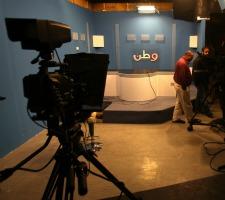BOB GARFIELD: This is On the Media. I’m Bob Garfield.
BROOKE GLADSTONE: And I’m Brooke Gladstone. The Palestinian Authority is clamping down on its critics. Recently, it’s blocked several opposition web sites, its security forces have arrested journalists and an activist and on Thursday the communications minister resigned in response to the Authority’s curbing of press freedom.
Meanwhile, Al-Wattan, an independent TV station based in the West Bank, is being sued for a million dollars over its corruption investigation involving the son of a Palestinian official, according to The Guardian. And this follows raids in February by Israeli Defense Forces on both Al-Wattan TV, and Al-Quds Educational TV, which supplies such programs as Sesame Street to the community.
Journalist Daoud Kuttab helped set up Al-Quds TV back in 1996, the same year as Wattan. He says that back then the Palestinian media landscape was barren.
DAOUD KUTTAB: Before 1993, there was no Palestinian television of any sort. As part of the Israeli-Palestinian Oslo Agreement, two things happened. The Israelis reluctantly agreed to allow Palestinian Authority to establish a national television and radio station, but also local entrepreneurs created low-power TV and radio stations that broadcast terrestrially in the cities. In addition, the agreement includes a clause that sets up a joint Israeli-Palestinian Technical Committee. And this committee is supposed to look at requests for frequency allocations but it had to be in agreement by both parties.
BROOKE GLADSTONE: How did that work out?
DAOUD KUTTAB: Well, it didn’t work out because the Israelis never allowed this committee to meet, and because you need both sides to meet, then basically the Israelis had a veto power of anybody getting any licenses. So when the committee never met, individuals literally took the frequencies. I mean, people set up stations, bought in the black market a transmitter and just went on the air. Eventually, the Palestinian Authority basically recognized these frequencies, but it was basically an attempt to regulate something that was already taken by individuals doing it on their own.
BROOKE GLADSTONE: So how did the Israelis approach these stations?
DAOUD KUTTAB: The Israelis basically turned a blind eye to this, except a few cases in which some of the frequencies interfered with airport frequencies or military frequencies, and then they would usually issue a very tough warning to the Palestinian Authority, and usually the Palestinian Authority would inform that particular station to shift their frequency one way or another to avoid the areas where the Israelis were upset about.
BROOKE GLADSTONE: You actually helped establish Al-Quds, which is one of the two TV stations that were raided by the Israelis in February. What kind of a role did Al-Quds and Al-Wattan play in the region? What’s their significance now, in an age where there’s a lot of satellite and television channels?
DAOUD KUTTAB: You know, it’s like in the States you have something called public access stations.
BROOKE GLADSTONE: Mm-hmm [AFFIRMATIVE].
DAOUD KUTTAB: It’s not so popular but, you know, there are some people who do watch it, and some people who don’t have satellite stations watch it. There are issues that are dealt with locally that are not covered in any national station but it’s not a major influencer of the public. As a terrestrial local station, Wattan is an important factor.
BROOKE GLADSTONE: So the Israelis raided Al-Wattan and Al-Quds in February. You’ve said the reasons aren’t really important; what’s important is that these frequencies just aren’t being regulated properly.
DAOUD KUTTAB: That’s true. I mean, the Israelis have basically two choices. They can have the joint committee meet and have these frequencies regulated or if they have a particular problem with a particular frequency, as in these two cases, they could have done it the civilized way. You don’t just barge in, in the middle of the night and take the transmitters.
In the overall Middle East conflict, is it a major issue? I – no, I wouldn’t argue that but, but it does reflect the power structure in which occupying powers just barge in, using its military power to exercise subjugation of a population that’s under occupation.
BROOKE GLADSTONE: Daoud, thank you very much.
DAOUD KUTTAB: You’re welcome.
BROOKE GLADSTONE: Daoud Kuttab is a journalist, TV producer, former Princeton professor and general director of Community Media Network.

